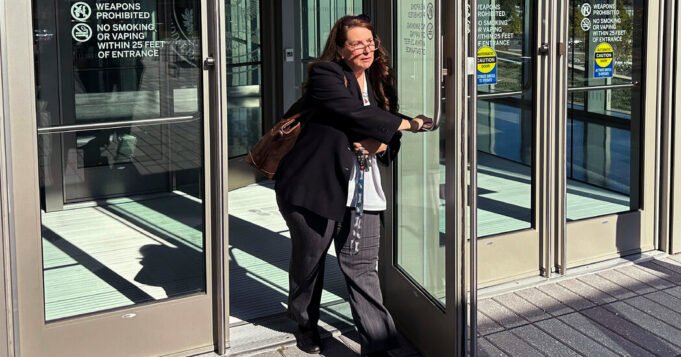Trump Empowers Election Deniers, Still Fixated on 2020 Grievances
Election officials from nearly all 50 states gathered on a call last month with the Homeland Security Department’s point person on “election integrity,” eager to hear how the woman filling a newly created Trump administration position might help safeguard the vote ahead of next year’s midterms.But many of them left alarmed.Rather than offering assurances that the federal government’s election protection programs would continue uninterrupted, the new official, Heather Honey, instead used portions of the meeting to echo rhetoric that has infused the right-wing election activist movement that emerged since President Trump falsely claimed that his 2020 defeat was the result of widespread fraud, according to five people with knowledge of the call.Ms. Honey, a leader in that movement until her appointment in August as deputy assistant secretary for election integrity, complained that her department’s cybersecurity experts tasked with combating misinformation about elections had “strayed from their mission.”The remark echoed a widespread view on the right that the agency had sought to silence supporters of Mr. Trump’s fraud claims. Ms. Honey also repeatedly mentioned a report often cited by election conspiracists to support their claims that voting machines were rigged to favor Democrats, according to the people familiar with the call.The ascent of Ms. Honey reflects how Mr. Trump and his allies, despite a clear victory last year, remain consumed with the belief that the 2020 election was stolen — and how the president is using the powers of the government to upend an electoral system that he insists helped Joseph R. Biden Jr. take the White House.In the past few months, Mr. Trump has elevated multiple proponents of his fraud claims into high-level administration jobs. Now, as government insiders, these activists could wield their newfound power to discredit future results or rekindle old claims to argue for a federal intrusion into locally administered voting systems.On a call with right-wing activists in March, before her appointment to the Homeland Security Department, Ms. Honey suggested that the new administration could declare a “national emergency” and justify dictating new rules to state and local governments. She said this could be based on an “actual investigation” of the 2020 election if it showed there had been a “manipulation” of the vote.“And therefore, we have some additional powers that don’t exist right now,” she said in March, according to a recording reviewed by The New York Times from someone who joined the call, “and therefore, we can take these other steps without Congress and we can mandate that states do things and so on.”She added, “I don’t know if that’s really feasible and if the people around the president would let him test that theory.”The idea of reinvestigating the 2020 election gained steam recently with the White House’s decision to hire Kurt Olsen, a lawyer who has been tasked with examining the 2020 vote and other election matters, according to a White House official. The hiring of Mr. Olsen, who has worked closely for years with the pillow entrepreneur Mike Lindell to promote stolen-election theories, was first reported by The Wall Street Journal.Another activist, Marci McCarthy, who spread debunked claims about voting machines in Georgia when she was the chairwoman of the DeKalb County Republican Party, was named in May to be the director of public affairs at the Cybersecurity and Infrastructure Security Agency, or CISA, which is housed at the Homeland Security Department.Ms. McCarthy’s appointment comes as nearly all of the election experts at CISA have been placed on administrative leave or reassigned this year amid a large-scale downsizing of the agency, which had played a leading role in deterring attacks on elections systems and combating disinformation about voting.The changes are unfolding as Mr. Trump takes steps to try to create more structural advantages for Republicans ahead of the 2026 midterms, including pressuring G.O.P.-led states to redraw congressional district lines to maximize the party’s chances of keeping control of the House of Representatives.Now elections officials who have spent years trying to debunk false claims that the voting systems were tilted against Mr. Trump are assessing how to work with some of the most fervent proponents of those claims.“These people are not coming with an objective frame of mind to say let’s look at the facts and see where that takes us,” said Matt Crane, a former Republican elections official who is the executive director of the Colorado Clerks Association and served until earlier this year as a consultant for CISA. “They have their destination in mind and cherry-pick facts to help stand up their crazy theories, so there’s nothing objective about it.”Ms. Honey and Ms. McCarthy did not respond to requests for comment.In response to questions from The Times, the Homeland Security Department declined to give specifics about the department’s election work. A homeland security spokeswoman, Tricia McLaughlin, said in a statement that CISA’s “mission is ensuring state and local election officials are cognizant of and utilize the most capable and timely threat intelligence, expertise, resources they need to defend against risks, and identify critical infrastructure security needs to maintain electoral functions.” She also said that the agency’s new hires “go through a rigorous vetting process.”Cleta Mitchell, the Republican lawyer who helped Mr. Trump challenge the 2020 results and worked with Ms. Honey and Ms. McCarthy through the activist group she founded, the Election Integrity Network, praised the homeland security appointments.“These are the very kind of election integrity leaders every American can be proud to have at D.H.S.,” Ms. Mitchell said.The moves by Mr. Trump to elevate election activists could portend escalating legal battles over how much power his administration wields over balloting across the country.Already this year, courts have affirmed that the president has no legal authority over elections, which have long been the domain of state and local governments. Judges have largely blocked an executive order that Mr. Trump issued in March requiring, among other changes, documentary proof of citizenship to vote.But the Trump administration has taken other aggressive steps to assert more sway over elections.The Justice Department, for instance, is compiling the largest set of national voter roll data it has ever collected, an effort to try to prove unsubstantiated claims that large numbers of undocumented immigrants have voted illegally, The Times previously reported.And in a separate effort that also collects similar details, the Homeland Security Department has been soliciting election officials to upload voter information in bulk through a program it developed that checks immigration status, according to documents released in a recent lawsuit and other documents viewed by The Times. State election officials have long rebuffed attempts by the department to access state voter rolls, warning that sharing this data could expose sensitive information like Social Security numbers, or be used to gain an uneven political advantage.Activists in the GovernmentMs. Honey has traced the roots of her election skepticism to the aftermath of the 2020 election, in the wake of a widespread legal and public relations effort by Mr. Trump and his allies to push the false notion that he was the victor and to discredit results that showed otherwise.There is no indication that Ms. Honey, a registered Republican, had been active in politics before 2020. She had worked as a private investigator for companies, hunting for stolen and counterfeit goods and scouring the social media accounts of potential employees, according to a person with knowledge of her background.She has said that after casting a ballot in Lebanon, Pa., where she lives, she began researching the state election department’s website and saw numbers that she felt did not make sense. Eventually she hit on what she claimed was an apparent discrepancy between the number of voters recorded in one tracking system and the official tally of votes cast.The claim has been repeatedly disputed by election officials who said she was misinterpreting and misusing a state database that tracks registered voters and whether or not they voted in previous elections.Nonetheless, Ms. Honey shared her claim with Trump allies in her state. And soon Mr. Trump was repeating it.“So in Pennsylvania, you had 205,000 more votes than you had voters,” he said in his speech from the Ellipse on Jan. 6, 2021, shortly before his supporters stormed the Capitol. “And this is a mathematical impossibility unless you want to say it’s a total fraud.”When Mr. Trump finally returned to his Florida estate, Mar-a-Lago, his court challenges defeated, Ms. Honey was just getting started.In 2022, she was a leading witness in an election challenge brought by Kari Lake, the losing candidate for Arizona governor. Mr. Olsen, the lawyer recently hired by the White House, served as one of Ms. Lake’s attorneys in the case.Ms. Honey claimed that one county’s election procedures could have allowed false ballots to be counted, but under questioning she acknowledged that she had no evidence that this had occurred on a large scale.A judge found that her claim “would not come close to clear and convincing evidence that the election outcome was affected.”By that point, Ms. Honey had become influential within the Election Integrity Network, the large coalition of pro-Trump election activists headed by Ms. Mitchell. She went on to run the network’s Pennsylvania group.In 2023, Ms. Honey’s company was paid $121,284 from Ms. Mitchell’s organization for consulting work, according to I.R.S. records.Ms. McCarthy, meanwhile, was an active contributor to the Election Integrity Network’s Leadership Council, according to a portion of her website that has since been deleted. She worked to place far-right activists on the local election board in DeKalb County, and was instrumental in forcing out a member of the Georgia State Election Board who voted against a rule to end mail voting in the state.Mr. Trump’s victory in 2024 created a wave of momentum for the Election Integrity Network, as its members sought to capitalize on the new administration’s posture toward elections. The first step was to draft a list of demands that sought to provide something of a blueprint for the federal government.The document, titled “US Citizens Elections Bill of Rights,” called for new restrictions on mail ballots and early voting, and included provisions that would make it easier to get people removed from voting rolls and challenge the certification of election results.The efforts mirrored elements of Mr. Trump’s executive order on elections and a bill passed by the House but stalled in the Senate, known as the SAVE Act, which would require all voters in federal elections to show proof of citizenship.Ms. Honey, Ms. Mitchell and other members of the Election Integrity Network watched from the public gallery in April as the House passed the elections bill, and then posted on social media a photo of the group posing afterward on the balcony off Speaker Mike Johnson’s office.Alarm and ConfusionThe meeting last month between Ms. Honey and election officials from all 50 states came as many election officials had begun to wonder whether the federal government would continue to be a reliable partner.After hearing about the Trump administration’s cuts to the cybersecurity agency, including the loss of around 25 staff members who had worked on election issues at the local and national levels, many were looking forward to hearing what the Homeland Security Department — and Ms. Honey — planned to focus on.But the call, which lasted roughly an hour, left officials both confused and anxious about some of Ms. Honey’s responses, according to five people familiar with the call.When asked what her role entailed, these people said, Ms. Honey did not offer specifics. She said that she would also serve in an advisory capacity to CISA, but also added no further details.In addition to questioning CISA’s adherence to its cybersecurity mission, Ms. Honey made unspecified claims of censorship at the agency, a common complaint among right-wing election activists that struck a number of officials on the call as misguided.She said that the department would be working on issuing “best practices” for election machines, and made multiple references to a report that has been wrongly interpreted by right-wing activists as part of their claims that election machines had been hacked and could not be trusted.State election officials asked Ms. Honey about restoring funding for information centers that were previously run by CISA and were a critical element of election security. Ms. Honey said that they would not be returning, and that states should plan to use “fusion centers,” which are hubs for collaboration across intelligence and state, local and federal law enforcement, for election matters.This caused some concern among election officials, who wondered how the fusion centers, which are often tasked with coordinating responses for major events like the Super Bowl, would have the bandwidth to help ensure election security, according to the people with knowledge of the call.Ms. Honey’s direct involvement in the Election Integrity Network stopped after her appointment, but she participated in a national leadership call for the group a few weeks ago, according to a person familiar with the call. She apologized that she could no longer work closely with her former colleagues.Zolan Kanno-Youngs and Tyler Pager contributed reporting. Susan C. Beachy and Kirsten Noyes contributed research.
已发布: 2025-10-22 10:00:00
来源: www.nytimes.com











